 Petzlover
Petzlover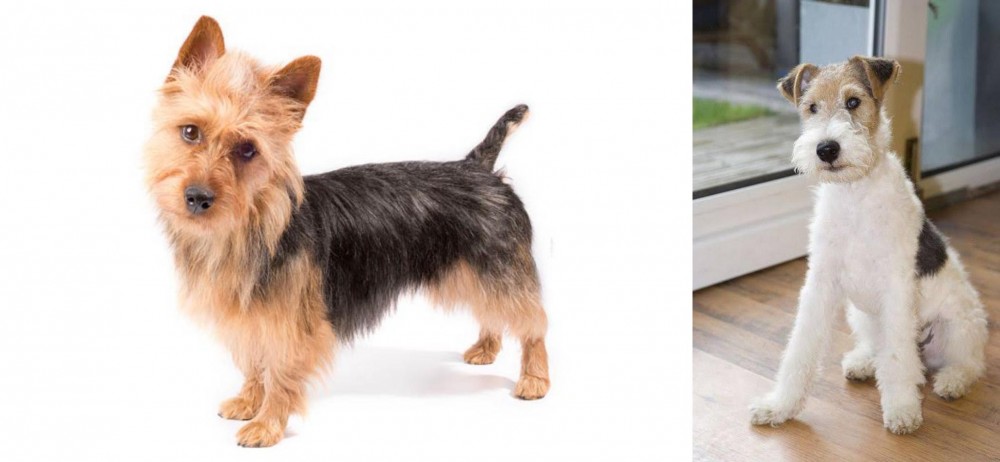 Australian Terrier is originated from Australia but Wire Fox Terrier is originated from United Kingdom. Australian Terrier may grow 13 cm / 5 inches shorter than Wire Fox Terrier. Both Australian Terrier and Wire Fox Terrier are having almost same weight. Both Australian Terrier and Wire Fox Terrier has almost same life span. Both Australian Terrier and Wire Fox Terrier has same litter size. Both Australian Terrier and Wire Fox Terrier requires Moderate Maintenance.
Australian Terrier is originated from Australia but Wire Fox Terrier is originated from United Kingdom. Australian Terrier may grow 13 cm / 5 inches shorter than Wire Fox Terrier. Both Australian Terrier and Wire Fox Terrier are having almost same weight. Both Australian Terrier and Wire Fox Terrier has almost same life span. Both Australian Terrier and Wire Fox Terrier has same litter size. Both Australian Terrier and Wire Fox Terrier requires Moderate Maintenance.
 The Australian terrier, the little terrier, is a breed developed to control vermin. The nature of this dog is very spirited. They are alert, courageous and self-confident but still very human-friendly.
The Australian terrier, the little terrier, is a breed developed to control vermin. The nature of this dog is very spirited. They are alert, courageous and self-confident but still very human-friendly.
Australian terriers were breed by the mix of the Terrier with the rough coat and Scotch Dog of Great Britain. These breeds were mixed until they produced the muscular and fearless dog for the Australian settlers. Their primary job was to control the number of rodents and snakes. They were taught to tend flocks, be an excellent guard dogs but remain friendly. This breed is still very popular as a working dog, loyal companion and dogs for show, city, home or a farm.
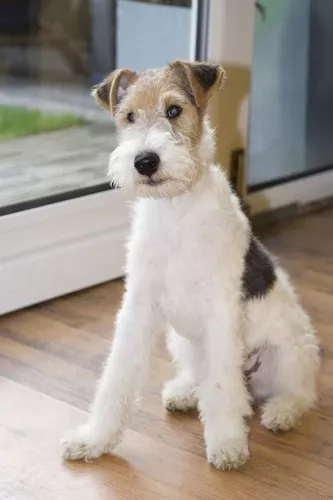 The wire fox terrier was developed in England by fox hunting enthusiasts. They wanted a feisty dog that could chase foxes down their burrows.
The wire fox terrier was developed in England by fox hunting enthusiasts. They wanted a feisty dog that could chase foxes down their burrows.
It is thought that the dog descended from the rough-coated black and tan working terriers of Wales.
The dog wasn’t popular as a pet until the 1930s when its appearance in certain films gave it a popularity-boost.
 The Australian terrier has body longer than they are tall. They are small dogs with the long and thick coat with silky undercoat and short little legs. This smart-eyes breed is perfect for persons who live indoors. But, you must know that they really like to bark and communicate that way with everybody. They also have a high need for activity so it will be necessary to take him out so he can run, play and be social with other dogs. They are very intelligent, but not very responsive. They will quickly learn how to fetch, but they will have days when they just feel like fetching.
The Australian terrier has body longer than they are tall. They are small dogs with the long and thick coat with silky undercoat and short little legs. This smart-eyes breed is perfect for persons who live indoors. But, you must know that they really like to bark and communicate that way with everybody. They also have a high need for activity so it will be necessary to take him out so he can run, play and be social with other dogs. They are very intelligent, but not very responsive. They will quickly learn how to fetch, but they will have days when they just feel like fetching.
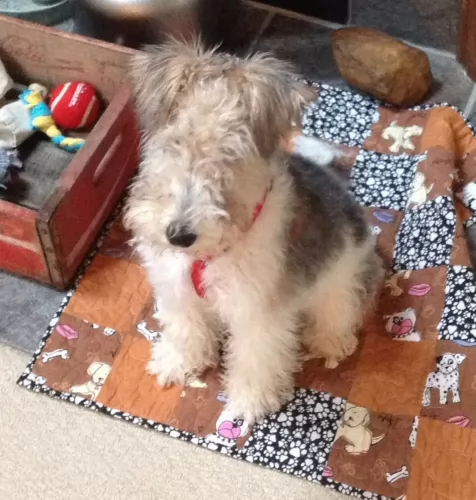 The Wire Fox Terrier is a sturdy, medium-sized dog that weighs between 7 and 9kg and stands between 35 and 39cm at the withers.
The Wire Fox Terrier is a sturdy, medium-sized dog that weighs between 7 and 9kg and stands between 35 and 39cm at the withers.
The dog’s double coat is essentially white with brown or tan markings and can be medium length and wiry, tending to be curly too.
He is a light shedder. The face is long, without much shape and eyes appear to be fairly close together. The ears are fairly small and they fold forward toward the cheeks. The tail is docked and is held high.
This really is an intelligent dog and can’t tolerate being bored. It’s essentially a companion dog too and doesn't want to be separated from his owners for too long.
As a companion dog he is going to want a lot of attention. They’re independent and strong-willed and will benefit from training and socialization.
They are great around children but they do need to be supervised as they are inclined to nip, especially when highly excited. They also bark quite a bit and the owner might have to do something to stop this yapping, especially when the dog is bored.
 The Australian terrier is very good breed to choose if you have children. They are active and always ready to play, and they will protect the children since they have watchdog gene.
The Australian terrier is very good breed to choose if you have children. They are active and always ready to play, and they will protect the children since they have watchdog gene.
Excellent watch dog. This breed will keep your garden and home vermin free.
They are generally very polite towards strangers and highly adaptable among other dogs, but their adaptability in social life is totally up to the human and the training. They can grow to be adaptable dogs that fit well into almost any environment; city or country, house or apartment.
Since they are an intelligent breed, the Australian terrier may surprise you with their ability to learn new tricks and shock you with their ability to be very strong willed about doing what is told. It’s not that they are not the type to obey and be “a good dog”, they are so playful and silly that they will often forget that they are the god and not the human. You must start training them while they are still pups.
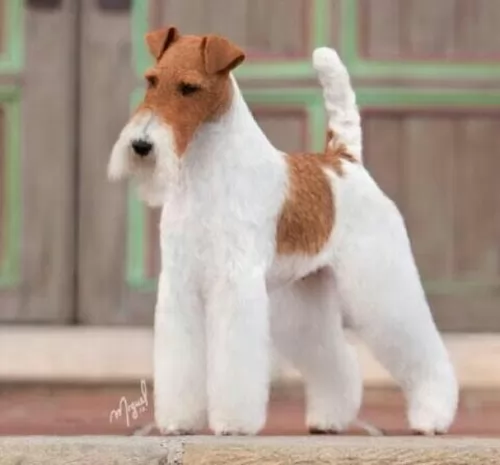 The Wire Fox Terrier is such a canine friend, ready to be with you no matter what you’re doing. They are social dogs and love being involved with their human companions.
The Wire Fox Terrier is such a canine friend, ready to be with you no matter what you’re doing. They are social dogs and love being involved with their human companions.
He is independent but still social and enthusiastic and you can describe him as the ideal family dog.
He is a bundle of energy, and when you bring him into your home, you’re going to get a family member who is playful, joyful, loving and loyal – your very best friend.
 A bone disorder, where the hip joint starts to rot caused by decaying of the femur bone which is located in the dog’s hind limb.
A bone disorder, where the hip joint starts to rot caused by decaying of the femur bone which is located in the dog’s hind limb.
Luxating patella is a knee disease where one or both kneecaps can slip out of place.
Rupture of an important ligament in the knee (stifle) joints.
The brain disorder that is characterized by seizures. There are several different types of epilepsy that can affect dogs.
A chronic disease of the metabolism which is characterised as high glucose amount in the blood. This happens when hormone insulin drops below the normal values. This condition results in malfunction of vital organs.
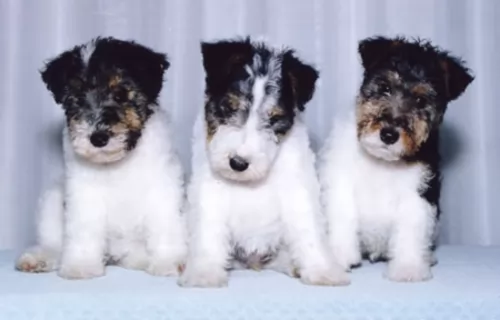 These are healthy dogs, and if you get your dog from a responsible breeder, he will have been checked for health conditions such as cataracts, hip dysplasia, and luxating patellas.
These are healthy dogs, and if you get your dog from a responsible breeder, he will have been checked for health conditions such as cataracts, hip dysplasia, and luxating patellas.
Cataracts are a problem with the lens of the eye. The lens focuses light and it should be crystal clear. A cataract obscures vision. Sometimes the cataract can be very small but other times it can grow to the size of the lens and then it can cause blindness.
Most times, dogs with cataracts can still see, and even though a dog may experience some confusion with a cataract, they don’t hurt the dog. They don’t go away on their own and will need to be removed surgically. If you see your dog has a cataract, consult your vet to get their opinion on the matter.
Your dog may be licking and scratching a lot and it may just be that your dog has a frustrating and irritating skin problem. This itching isn’t a disease but rather a cause of some disease.
There could be so many things that are causing your pet to scratch and it could be a skin disease, parasites or allergies. It can be terrible seeing the frustration it causes your pet and he will certainly need to see the vet.
 Recommended daily amount is usually found on the type of the food you choose. They like dry food, and if you are not quite sure what brand of the dry food you should choose, seek a vet’s advice. The Australian terrier has a healthy appetite, but he almost never overeats. How much your Australian terrier eats depends on his size, age, metabolism, and activity level.
Recommended daily amount is usually found on the type of the food you choose. They like dry food, and if you are not quite sure what brand of the dry food you should choose, seek a vet’s advice. The Australian terrier has a healthy appetite, but he almost never overeats. How much your Australian terrier eats depends on his size, age, metabolism, and activity level.
Their coat requires moderate maintenance. That means that you don’t have to groom your Australian terrier every single day, but being aware of the importance of grooming him at least twice a week is a key because lack of adequate care may lead to skin diseases. Make sure not to bathe them too much, but you can be free with their haircut. They can grow very sharp toenails, so they should be clipped regularly. Ear and teeth must be kept clean.
Lots of outdoor activity. They are lovable kind, so don’t be reserved towards them. It’s important to begin training and socializing your pup as soon as possible. Training sessions need to be consistent, firm, short and clear. Grooming is a must since you will want to prevent the tangles and mats.
Find a place for them where you can take of the leash and let them run free. They love chasing birds, butterflies and anything that flies above. They will chase small rodents, other dogs and cats. After you thought you Australian terrier how to play with other dogs and cats, they will be the most wanted guest in the whole neighbourhood. Find a place where they can dig holes – and they will be so happy that they probably won’t hear you calling them home.
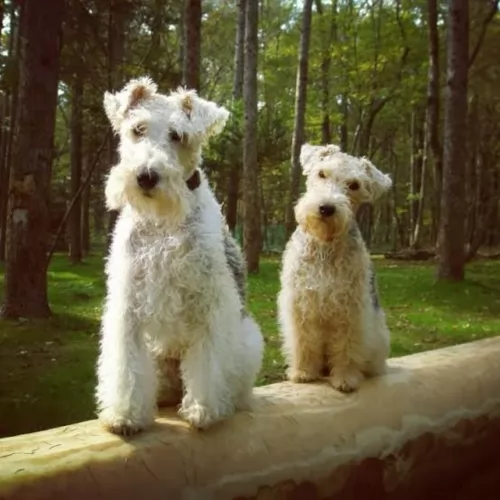 This dog will need to be brushed regularly. Some people hand-strip their dogs. Most people prefer just to take their pets to a professional groomer to have them professionally clipped. The groomers will simultaneously clip his nails, clean the inside of his ears and also clean his teeth.
This dog will need to be brushed regularly. Some people hand-strip their dogs. Most people prefer just to take their pets to a professional groomer to have them professionally clipped. The groomers will simultaneously clip his nails, clean the inside of his ears and also clean his teeth.
The Wire Fox Terrier will expect you to supply him with high-quality dog food if you opt to use commercially manufactured dog food. These foods can be wonderfully convenient but you want the food to be packed with natural ingredients and be high in vitamins and minerals.
Any diet should also be appropriate to the dog’s age, his size, and his activity levels. Some homemade foods can also be a treat but this needs to be simple with no heavy spicing. Things such as boiled chicken, brown rice and vegetables can be an excellent choice.